I REMEMBER MAMA
***/**** Image B+ Sound A-
starring Irene Dunne, Barbara Bel Geddes, Oscar Homolka, Philip Dorn
screenplay by Dewitt Bodeen, based on the play by John Van Drutten
directed by George Stevens
GEORGE STEVENS: A FILMMAKER'S JOURNEY
**/**** Image A- Sound A-
directed by George Stevens, Jr.
by Travis Mackenzie Hoover Andrew Sarris once remarked that George Stevens was "a minor director with major virtues" who became "a major director with minor virtues." He was referring to the point at which Stevens cast screwball frivolity aside in favour of the lugubrious, but there's more complexity to the A Place in the Sun helmer than that: he was simultaneously light and heavy, keeping details in focus as he blew small stuff way out of proportion. His dramatic talent is the kind that gets overestimated by Oscar-watchers but underestimated by intellectuals, falling in some distorted medium that is major and minor at the same time.
The two extremes can be gauged by comparing the reality of I Remember Mama, a family drama that walks the line between art and schlock without ever falling off, and then watching it through the hagiographic prism of George Stevens: A Filmmaker's Journey, which unfortunately glorifies the worst impulses in the elder Stevens's work without dealing with his many pluses. At first glance, I Remember Mama is a pretty standard family-saga melodrama: the Norwegian Hanson clan, guided largely by clearheaded mother Martha (Irene Dunne), has everything you'd expect–tight finances (they live in constant fear of having to "go to the bank"), illness (a young child endures surgery), difficult relatives (proud, irascible Oscar Homolka), and a few other chestnuts fill out the long march to total togetherness.
But somehow, Stevens resists the urge to bulletproof everything. The John Fordian belief in people's total resilience isn't here at all: there's a tinge of resentment around the unusually shadowy frames, a sense that this isn't the way things are supposed to be and that the Hanson family deserves better. The Mama who plays go-between for unpopular relatives and must part with heirlooms so she can afford presents is not a superhuman font of love but rather a normal woman forced to make do. While the genre may be corny, Stevens's inflections are not, and they lend the characters dignity instead of denying their pain with the standard we're-the-people-and-we-keep-going crap. In spite of his lofty ambitions, Stevens shrinks the overstuffed genre to human size, denying it obvious catharsis until the very end. It's a small victory, but a strangely potent one.
Unfortunately, pop history has come to remember the desolate trio of A Place in the Sun, Shane, and Giant as the pinnacle of the director's art–brushing off his lighter-yet-tighter early successes and crushing the painstaking miniaturist at the heart of the sacred monster. Alas, son George Stevens, Jr. more often than not takes this position as well in his A Filmmaker's Journey, a loving but blinkered tribute to his father's schizoid legacy: a career initially marked by Gunga Din adventure and Tracy-Hepburn romcom whose segue into the seriousness of that dubious 1950s trilogy was the consequence of a traumatic encounter with WWII. The film thus adopts the questionable position that Stevens was a serious dude long before his conversion, lavishing importance on comic sequences as if they didn't have the right to exist as simple pleasure. Stevens, Jr. mistakes the strenuous for the serious, and in so doing loses a chance to put the stylistic about-face into perspective.
A few interesting bits remain. There's the matter of the McCarthy-era DGA incident, in which Cecil B. DeMille attempted an anti-Communist putsch; Stevens resigned in protest, though John Ford famously got the last word. And Paramount's low opinion of Shane is hilariously recounted, including their fortuitously vain attempt to sell off what was expected to be a flop. But mostly, the piece is short on analysis, wrapping things cinematic up in a sentence or less before moving on to fixate on what a swell guy Stevens was. I was happy to hear Katharine Hepburn's annoyance at his abandonment of comedy, yet critical remarks like that are few and far between, subsumed in the rush to make a monument out of a contradictory talent. Stevens was at once white elephant and termite (to take a page from Manny Farber), and to privilege one over the other is to obscure his actual achievement(s).
THE DVDsWarner presents the black-and-white I Remember Mama on DVD in its original fullscreen aspect ratio. The transfer is perhaps a little bleached-out, but fine detail is fairly good and only the occasional print defect mars the picture. The 1.0 mono sound is better, clean and sharp and surprisingly potent. In an optional video introduction, George Stevens, Jr. places the film in the context of his father's postwar concerns before descending into vague and reverent gush, while the film's trailer rounds out the disc.
The same studio's George Stevens: A Filmmaker's Journey is technically superior. The fullscreen image is perhaps a tad oversaturated (at least as it pertains to the talking heads footage) but otherwise fine, with clips from the man's filmography looking pristine. The centre-channel mono sound is startlingly full-bodied with regard to the film excerpts and interview audio alike. The sole extra is a Stevens bio that would appear to be utterly superfluous when placed next to the film it supports.
- I Remember Mama
134 minutes; NR; 1.33:1; English DD 1.0; CC; English, French, Spanish subtitles; DVD-9; Region One; Warner - George Stevens: A Filmmaker's Journey
112 minutes; NR; 1.33:1; English DD 1.0; CC; English, French, Spanish subtitles; DVD-9; Region One; Warner




